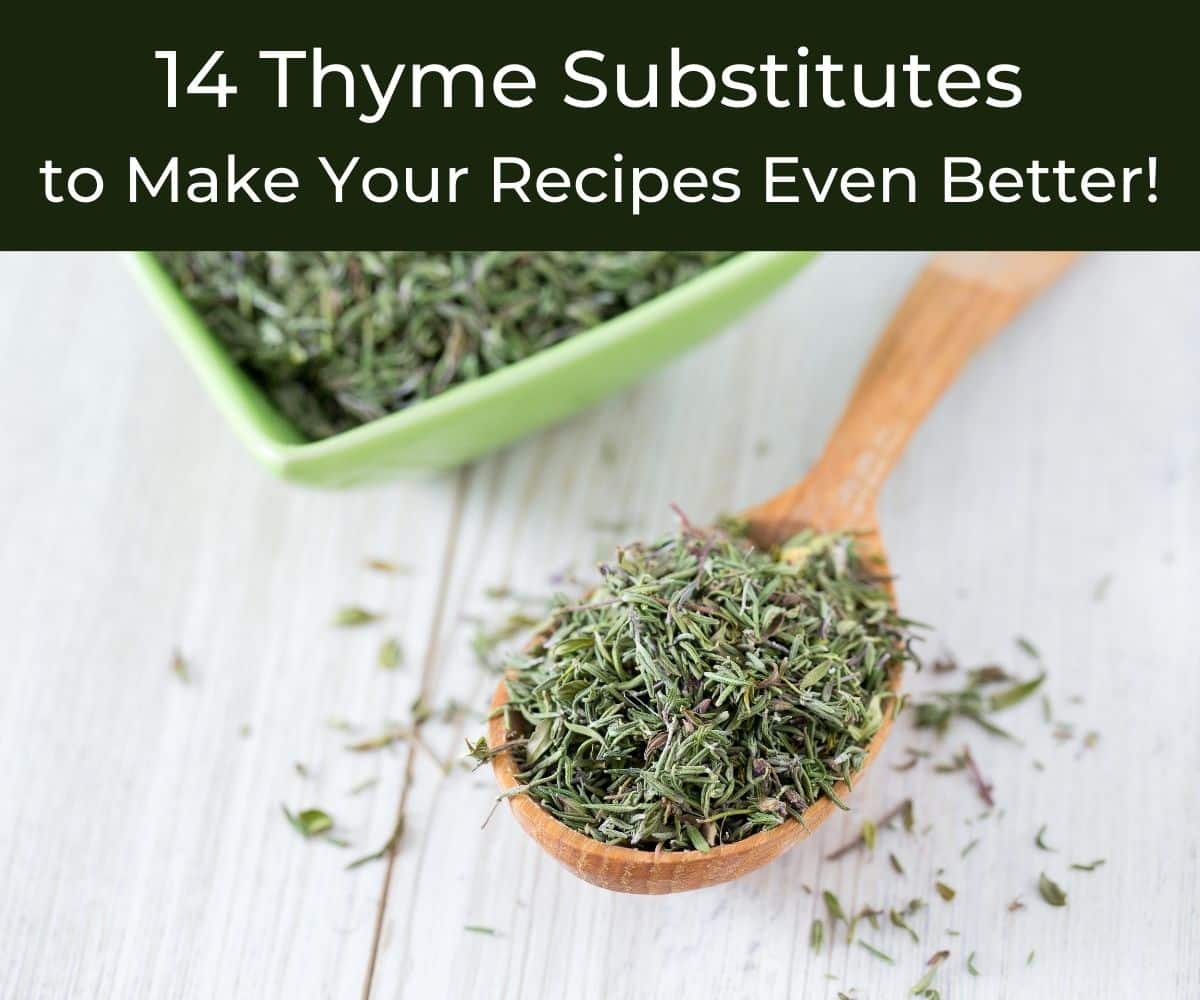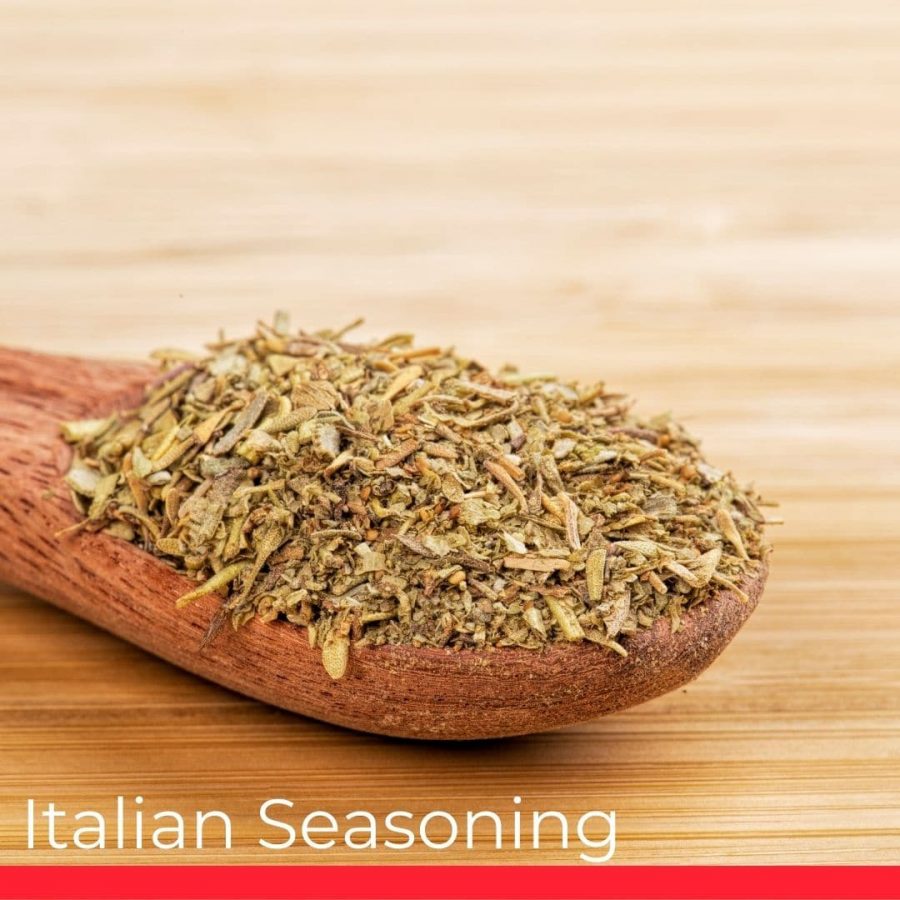14 Thyme Substitutes to Make Your Recipes Even Better!

Thyme is a popular herb all over the world. It works wonders with many recipes and can be used both fresh and dried. While it may seem irreplaceable, we provıde you with some thyme substitutes for when you ran out of the aromatic herb.
As can so often happen, you notice you’ve run out of thyme, right around the time you’ve started to prep the dish. So, do you change the menu or do you look for some thyme alternatives? If you’re brave enough to carry on with what you planned, you may be surprised!
Thyme Flavor Profile
Thyme can be added to savory recipes and sweet dishes. Its flavor profile makes it one of the most popular herbs:
- Thyme has a slightly minty undertone (did you know this aromatic plant is in the mint family?).
- Thyme has a pronounced earthy flavor.
- Thyme has a fresh, herbaceous, and a rather floral scent, being quite fragrant.
- Thyme has a mild citrus aroma. It’s like a delicate note, not an intense vibe.
- Thyme has a woody tint, which makes it robust, complex.
It’s all these contrasting elements that make thyme so versatile. It goes with meats, potatoes, veggies, pasta, baked goods, fish, and even cheeses.
It’s perfect in stews, soups, anything sauce-based, broths, and cooked dishes since it maintains its aroma even in high temperatures. It’s even perfect in cookies, cakes, chocolate, lemonade, and various cocktails. Seems like quite a catch! And one not to be missing in your kitchen! Still, here is what to use in place of thyme, if necessary:
14 thyme substitutes: choose the one for your recipe!
While we do recommend you juggle with ingredients and get creative in the kitchen, remember that alternatives will never provide you with the exact same aroma, taste, and texture as the real deal.
Sure, some spices and herbs work better than others. But when it comes to dishes that list thyme as the main ingredient, you should not replace the star of the show. In such cases, it’s better to get thyme from the market. Or simply leave it for another… uhm… thyme!
1. Oregano

This is the first on our list of herbs similar to thyme. Oregano has that same blend of earthy, minty, and lemony vibes to it. However, oregano is thyme’s stronger, pungent cousin, packing more flavor. So you should use about ¾ the amount of thyme the recipe mentions.
Works great with meats, cheese, tomato-based dishes, pasta, stews, and potatoes.
2. Herbs de Provence

Herbs de Provence is a great blend to use as a thyme sub. That’s because it contains thyme. It also contains basil, rosemary, marjoram, bay leaf, savory, and lavender flowers, so the mixture may alter the taste of the food. This blend is not as delicate as thyme, but it can be added in a 1:1 ratio, maybe a ¾ for the faint-hearted.
Works great with French and Mediterranean dishes, but you can add it to any recipe that calls for thyme.
3. Marjoram

If you require a dried thyme substitute, marjoram might just be for you. Their flavors are very much alike. Marjoram is quite delicate, just like thyme. It packs minty, earthy, woody, and floral touch, just like thyme. You can use it in a 1:1 ratio.
Works great with anything vegetable, beans, lentils, soups, and stews.
4. Italian Seasoning

This mixture is yet another of the best thyme substitutes you can find. Italian seasoning contains thyme, marjoram, oregano, savory, basil, sage, rosemary, and bay leaf. It’s rather sweet when it comes to flavor, and it will remind you of cloves too. You can use it in a 1:1 ratio.
Works great with any Italian dish (lasagna, spaghetti, any other pasta, different meats) but it does wonders in any savory recipe that calls for thyme.
5. Tarragon

While you wouldn’t think so, tarragon is a fine thyme replacement. It has a sweeter taste and a bitter touch, but it will do. And while you’d think that the anise and mint aroma is what would make thyme and tarragon not be swapsies, you’d be wrong. We recommend you start with a 1:2 ratio and go from there as you keep tasting your dish.
Works great with French dishes, and anything with chicken or fish.
6. Savory

Another member of the mint family, savory is one of the best thyme substitutes. Both winter and summer savory work as alternatives. Keep in mind that summer savory is rather peppery and winter savory is earthy and milder. Use them in a 1:1 ratio.
Works great with meats, fish, and rich, heavy recipes (summer savory) and in just about anything (winter savory).
7. Sage

Sage is a good substitute for thyme, especially when associated with meats. Sage comes with a minty aroma, a dash of earthiness, a slightly lemony vibe, and a hint of bitterness. Make sure to add in it small quantities. Maybe start with a 1:2 ratio.
Works great with anything meat-based or fish, but also anything tomato-based. It’s also great in marinades and sauces.
8. Poultry Seasoning

If you’re looking for a thyme substitute for chicken, this is the one! A pinch of poultry seasoning will add a touch of thyme. It will also add some salt, so make sure you adjust.
Works great with poultry but anything meat-based. It even works great with potatoes, roasted vegetables, and stews.
9. Rosemary

We think rosemary is the ideal thyme substitute for steak. While they do have some flavors in common, rosemary is more intense. They are both minty, woodsy, and earthy. But thyme is milder and also has a floral touch.
Rosemary is more pungent, reminding you of camphor. So, while rosemary can contribute to many dishes, as it is, if you’re looking to replace thyme, use half the amount.
Works great with potatoes, stews, roasts, veggies, and yes, meats. Especially steak, with a hint of butter and a couple of garlic cloves, for an aromatic finish. And, yes, cocktails too! Yum!
10. Bay Leaves

Yes, bay leaves can do the trick. Bay leaves will provide that blend of minty, piny freshness, and a hint of earthy, woodsy tones to your dish. One bay leaf can replace ½ teaspoon of fresh thyme or ¼ teaspoon of dried thyme.
Works great with any dish sauce or liquid-based: sauces, stews, soups, and broths. It’s also a great addition to any recipe with cabbage that includes thyme, and any type of beans.
11. Parsley

Fresh and versatile, herbaceous, aromatic, and sweet, parsley is a good alternative for thyme. You can use it in a 1:1 ratio. Even better, sprinkle in some other herb, such as marjoram, to get even closer to thyme’s flavor.
Works great with salads, vegetables, meats, fish, soups, and cream-based dishes.
12. Za’atar

While you would never think of za’atar as a spice similar to thyme, it can be! This blend of spices and herbs from the Middle East contains thyme. It also contains sumac, sesame seeds, oregano.
While thyme and oregano do not alter the flavor profile of the dish, sumac and sesame does. Sumac adds a sour, citrusy, tanginess, and tartness, while sesame adds a nutty, oily, rich, salty, and sweet vibe. Start with a 1:2 ratio and adjust as you go along.
Works great with plenty of meals, especially vegetables, beans, hummus, but also chicken, beef or roasted lamb.
13. Basil

Basil is another aromatic herb that can replace thyme. With a sharp, pungent aroma, basil is sweet with a hint of pepper and a dash of anise in its taste. It can replace thyme in a 1:1 ratio, but keep in mind it will change the final aroma of the dish. Dry basil may work better than fresh.
Works great with Italian dishes. Make sure to add it towards the end of cooking, so it keeps its flavor intact.
14. Lemon Thyme

While you can swap thyme and lemon thyme, it doesn’t always work. Thyme can be a lemon thyme substitute (especially if doubled by some lemon zest) and the other way around. But we do recommend you do this when it doesn’t come to specific recipes. For instance, if you’re cooking lemon thyme rice, you’re gonna know. They’re gonna know! 🙂
Works great with any dish that calls for thyme, to be fair. It’s going to add some other aromas in there as well, but it’s only going to enrich the experience.
Is dry thyme a good substitute for fresh thyme?

Fresh thyme is more aromatic, as usually happens with most dried herbs. Dried thyme loses its aromatic oil and its green color, but it does become stronger. The aroma becomes more compact. Still, while fresh thyme works at the start of cooking, dried thyme is better added towards the end.
In a nutshell, yes, you may substitute fresh thyme for its dry version. And here is how to substitute thyme when all you have is the dehydrated herb: about half the amount of dried thyme for any quantity of fresh thyme that the recipe asks for.
Hopefully, we’ve got you covered and some of our thyme substitutes have inspired you and kept you going. Do you have any other suggestions? Let us know!

